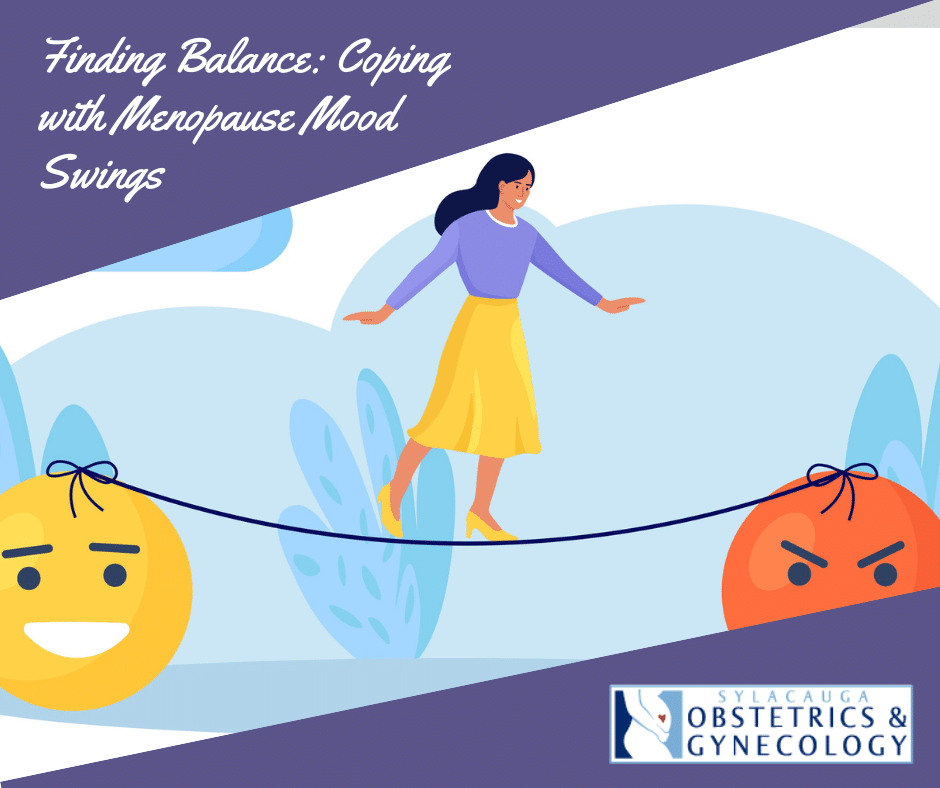
27 Jun Finding Balance: Coping with Mood Swings During Menopause
Menopause is a natural transition in a woman’s life, but it can bring a range of challenging emotional experiences. During this time, your body undergoes significant hormonal changes, which can profoundly impact your mood and overall well-being. Mood swings, irritability, and depression are common symptoms that many women struggle to manage during this phase of their lives.
However, with the right strategies and support, you can navigate the menopausal journey with greater ease and resilience. In this comprehensive guide, we’ll explore effective ways to cope with mood swings during menopause, empowering you to take control of your emotional well-being and embrace this transformative phase of your life.
Understanding Menopause & Its Impact on Mood
Menopause is the natural discontinuance of a woman’s menstrual cycle, typically occurring between the ages of 45 and 55. This transition marks the end of a woman’s reproductive years and is accompanied by a range of physical and emotional changes.
During menopause, your body experiences a significant decline in the production of primary female hormones. This hormonal shift can have a profound impact on your mood, leading to a wide range of emotional experiences, from mood swings and irritability to depression and anxiety.
Hormonal Changes During Menopause
- Estrogen Decline: As your estrogen levels decrease, you may experience heightened sensitivity, mood changes, and difficulty regulating your emotions.
- Progesterone Imbalance: The reduction in progesterone can contribute to feelings of anxiety, restlessness, and mood instability.
- Other Hormonal Fluctuations: The fluctuations in hormone levels during the menopausal transition can cause rapid and unpredictable changes in your mood, making it challenging to maintain emotional stability.
Common Symptoms of Mood Swings During Menopause
Mood swings during menopause can manifest in various ways, and the intensity and frequency of these symptoms may vary from woman to woman. Some of the most common symptoms include:
Irritability and Mood Changes
You may become easily irritated, snapping at loved ones, or experiencing sudden mood shifts, ranging from euphoria to profound sadness.
Anxiety and Nervousness
Feelings of anxiety, restlessness, and worry may become more prevalent, making it difficult to relax and enjoy your daily activities.
Depression and Mood Disturbances
Some women may experience depressive episodes, feelings of hopelessness, or a general sense of low mood during the menopausal transition.
Difficulty Concentrating
Hormonal fluctuations can affect your cognitive function, leading to problems with concentration, memory, and decision-making.
Sleep Disturbances
Insomnia, night sweats, and disrupted sleep patterns can contribute to mood instability and exacerbate other menopausal symptoms.
Recognizing these common symptoms can help you better understand and address the emotional challenges you may face during this transitional period.
Coping Mechanisms for Managing Mood Swings During Menopause
Navigating the emotional roller coaster of menopause can be daunting, but there are several effective coping mechanisms you can employ to manage your mood swings and maintain your emotional well-being:
Mindfulness & Stress Management Techniques
Incorporating mindfulness practices, such as meditation, deep breathing exercises, and yoga, can help you manage stress and promote emotional regulation. These techniques can provide a sense of calm and control during periods of mood instability.
Communication & Support Systems
Cultivating a strong support system, whether through open communication with your partner, family, or close friends, can be invaluable in helping you navigate the emotional challenges of menopause. Sharing your experiences and seeking understanding can alleviate feelings of isolation and provide a sense of community.
Cognitive-Behavioral Therapy (CBT)
Working with a mental health professional, such as a therapist or counselor, and engaging in cognitive-behavioral therapy (CBT) can help you develop coping strategies, challenge negative thought patterns, and improve your overall emotional well-being.
Journaling & Emotional Expression
Expressing your thoughts and feelings through journaling can be a powerful tool for processing and managing your emotions during menopause. This practice can provide a safe and cathartic outlet for your experiences.
Relaxation & Self-Care Practices
Incorporating relaxation techniques, such as warm baths, gentle exercise, or engaging in hobbies you enjoy, can help you manage stress and promote emotional well-being. Prioritizing self-care during this transition is crucial for maintaining a healthy mindset.
By incorporating a combination of these coping mechanisms, you can develop a personalized approach to managing your mood swings and maintaining a sense of emotional balance during menopause.
Medications & Therapies for Treating Mood Swings During Menopause
In some cases, medical interventions may be necessary to manage persistent or severe mood swings during menopause. Your healthcare provider may recommend the following options:
Hormone Replacement Therapy (HRT)
Hormone replacement therapy (HRT) can help alleviate mood swings and other menopausal symptoms by restoring the balance of estrogen and progesterone in your body. Your healthcare provider will work with you to determine the appropriate type and dosage of HRT based on your individual needs.
Antidepressant Medications
If you are experiencing persistent or severe mood disturbances, such as depression or anxiety, your healthcare provider may prescribe antidepressant medications to help manage these symptoms.
Complementary & Alternative Therapies
In addition to traditional medical treatments, some women find relief through complementary and alternative therapies, such as herbal supplements, acupuncture, or aromatherapy. It’s important to discuss these options with your healthcare provider to find remedies that are safe and effective for your specific needs.
Remember, it’s crucial to work closely with a trusted OB/GYN to develop a personalized treatment plan that addresses your unique menopausal experience and provides the support you need to manage mood swings effectively.
Sylacauga OBGYN: Empowering Women to Thrive During Menopause
Menopause is an inevitable transition in a woman’s life, but it doesn’t have to be a debilitating experience. By understanding the underlying hormonal changes and implementing effective coping mechanisms, you can take charge of your emotional well-being during this transformative phase.
Remember, you are not alone in this journey. Seek support from a reliable OB/GYN like us at Sylacauga OB/GYN to create a personalized treatment plan that works for you! We recognize that every woman is different, so we create an empathetic and comfortable atmosphere for every patient. To begin your journey toward emotional resilience, schedule an appointment at our office today!
Take Charge of Menopause: Book Your Consultation for Personalized Menopausal Management at Sylacauga OB/GYN
Embark on a journey towards confidently managing menopause with personalized care at Sylacauga Obstetrics & Gynecology. Our experienced team is dedicated to understanding and addressing the unique needs of women facing this transitional phase.
We’re here to guide you towards an improved quality of life by providing you a safe space and access to effective treatment options. Schedule your consultation today by contacting us online or calling us at (256) 510-7163 and take the first step towards reclaiming your well-being.


